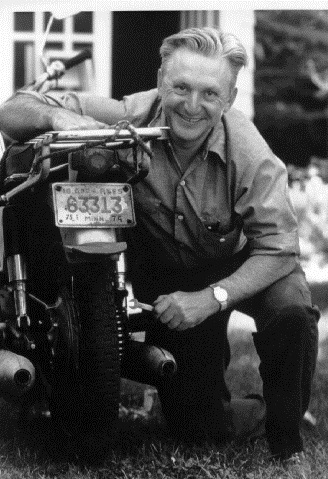ZEN MESTEREK ZEN MASTERS
« Zen főoldal
« vissza a Terebess Online nyitólapjára

Robert M. Pirsig (1928-2017)
Tartalom |
Contents |
A zen meg a motorkerékpár-ápolás művészete > PDF
PDF: Lila. Vizsgálódás az erkölcsről Fordította: Csák János Európa, 2007
|
|
September 6, 1928, witnessed the birth of Robert Maynard Pirsig in Minneapolis, Minnesota. He is the author of the cult classic, Zen and the Art of Motorcycle Maintenance. Pirsig's father, Maynard, taught at the University of Minnesota Law School from 1934 until retiring in 1970. He served as Dean from 1948 to 1955. Pirsig's mother, Harriet Marie Pirsig (Sjobeck), is of Swedish origin.
By the age of 9, Pirsig, a precocious child, already possessed an I.Q. of 170. He was promoted over several grades, and his lack of normal socialization, combined with a vexing stammer, made childhood difficult for him.
In 1943, Pirsig entered the University of Minnesota, where he struggled for the next two years with his classes. He was expelled in 1945 for failing grades, immaturity, and inattention to his studies. After traveling to Montana where he drifted aimlessly for several months, he joined the Army and served in Korea before returning to school, where he resumed his studies, concentrating on chemistry and philosophy. He received a B.A. in 1950 and enrolled in the University's School of Journalism two years later. He also attended Benares Hindu University in India, where he pursued knowledge about Oriental philosophy, although later references to his studies there cast doubt on how much he gained from the experience.
In September, 1953, Pirsig became co-editor with Nancy Ann James of The Ivory Tower, part of the University's literary magazine. James was an undergraduate journalism student who was married and still being supported by her parents. Pirsig and Nancy left school in the winter of 1953-54 and traveled to Reno, where she obtained a divorce. The two worked for a while as dealers in Reno's Nevada Club in order to capitalize a trip to Mexico, where Pirsig felt they could live more inexpensively while he tried his hand at writing professionally.
Pirsig and James married on May 10, 1954, and moved that September to Minatitlan on the Bay of Campeche for eight months. In May 1955, they returned to the states, where he pursued a variety of jobs. He returned to school and received his MA in journalism in 1958.
In the early Sixties, following a slow dance through hell with depression and mental illness that left him in and out of hospitals and treatment centers for more than two years, Pirsig had completed enough of his book entitled Zen and the Art of Motorcycle Maintenance to begin sending it off to publishers. He received more than 120 rejection slips before the manuscript finally landed in the hands of James Landis, an editor at William Morrow. Landis responded positively, encouraging Pirsig to finish the book. Finally, in 1973, after several false starts and numerous discarded drafts, he turned the completed manuscript over to Landis.
Pitching ZMM before Morrow's editorial board, Landis said, "This book is brilliant beyond belief, it is probably a work of genius and will, I'll wager, attain classic stature." Morrow paid the author its standard $3,000 advance and published the book the same year to rave reviews.
In 1975, Pirsig and his wife bought a boat together and began taking sailing lessons. Naively, they planned a trip around the world. Two years later, Pirsig was living on the boat in England with a woman named Wendy Kimball. He wrote an article entitled "Cruising Blues and Their Cure" for Esquire magazine. It was about the stress of boredom and claustrophobia, living in close proximity with loved ones in the confines of a boat. The following year, he divorced Nancy and married Wendy. In 1979, his first son, Chris, who had played an important role in the development of Zen and the Art of Motorcycle Maintenance, was stabbed to death during a random mugging in San Francisco.
The following year, Pirsig moved his second wife back to the more familiar grounds of Minnesota, where they lived near his paternal grandfather until wanderlust struck once more. In 1984, the couple moved to Sweden, where Pirsig began work on his second book, Lila, which was published in 1991.
Pirsig created the Metaphysics of Quality (MOQ) to explain in his books the connection between quality and morality to reality. Both of his books claim that the topic they are exploring cannot be precisely defined because of humanity's limited experience. ZMM in particular is an important work because it functions at several different levels:
In his work, Pirsig has coined several memorable phrases that refuse to die. He said that his book was luckily successful because it happened to be a culture-bearing book, and he called the fields of metaphysics and philosophy the high country of the mind.

Time For a Rest At The Camp Buell State Historical Site.
“ …. I suddenly notice the land here has flattened into a Euclidian plane. Not a hill, not a bump anywhere. This means we have entered the Red River Valley. We will soon be into the Dakotas. .... “
Mr. Pirsig's caption (2002): "Chris, Bob 1st day. N. D. --This is the picture that everyone sees in black and white. It was first sent to the English publisher, Bodley Head. They put it on their jacket and everyone picked it up from there. The location is a rest stop in North Dakota on the way to Oakes at about 5 or 6 PM during the first day out.
"A Successful Pirsig Rethinks Life of Zen and Science"
by George Gent
New York Times , May, 1974
Mr. Pirsig's 20-year struggle against the forces of academic reaction and the dualistic tradition of Western science and philosophy is poignantly recounted in his first book, Zen and the Art of Motorcycle Maintenance, a multileveled exploration of values and the author's disintegrating psyche.
Despite a title that might seem limiting to some readers, the book has received rave reviews and William Morrow, its publisher, reports that the first three printings of 48,000 hardcover copies are almost sold out, with a fourth printing planned. A major paperback publisher has also made a six-figure bid for the rights, and there is talk of a motion picture.
":It's a great feeling," he smiled, between sips of a martini at Barbetta's on West 46th Street.
:The last time I was in New York, no one knew if I existed -- or cared. It can be a very lonely place. I'm enjoying the new feeling of success, after all those years of rejection, but I worry about what success will mean to my life. I don't want to become too self-conscious about my work and I am aware that publicity seeks to rob you your hard-won privacy, transforming your private life into a public life. I think of what happened to writers like Ross Lockwood Jr., the author of Raintree County, and Thomas Heggen, the author of Mr. Roberts, both of whom committed suicide after they became successful. I want to continue writing and I have learned that I write best when I am neither too enthusiastic nor too depressed."
However, when the essay was completed, Mr. Pirsig said he was dissatisfied with the portions dealing with Zen and they became fewer.
On the other hand, as the book's ultimate design began to take shape, the number of publishers declined. Throughout the four-and-a-half years of its creation, only James Landis, a senior editor at Morrow, retained his enthusiasm and became its strongest advocate.
Perhaps the most compelling portions of the book deal with a mythical character called Phaedrus, a name me Pirsig drew from Plato's dialogues and who is soon perceived to represent the author at a period just before his breakdown.
Mr. Pirsig spent two years in and out of mental hospitals after his breakdown and says now that he has been exorcised of the spirit of Phaedrus, yet he feels somehow that he has betrayed his better self.
"At the hospital, they taught me to get along with other people, to compromise, and I agreed," he explained with a touch of remorse. "Phaedrus was more honest -- he would never compromise, and the young respected him for that."
In the book , the narrator puts it this way: "What I am is a heretic who's recanted, and thereby in everyone's eyes saved his soul. Everyone's eyes but one, who knows deep down inside that all he has saved is his skin."
There have been problems since, he admits, but things are more hopeful now. Asked about Chris's reaction to the book, the author said candidly. "At first, he was unhappy with it." But," he added with a smile, "Chris came to the party that launched the book, so I guess everything is all right."
Mr. Pirsig, who was born in Minneapolis and whose father Maynard E. Pirsig, is the former dean of the University of Minnesota Law School, still lives in the Twin Cities with his wife Nancy; Christopher who is now 17, and Theodore, 16, despite the city's many unhappy associations. He explains it this way:"
"You can't run away fro yourself, away from your past. My family and friends are there and if I am to accomplish anything it will be there. I want to overcome the idea that the Midwest is a cultural desert, although it often is. Minnesotans will accept things from a native that they never would from an outsider. For instance, I have helped establish a Zen Center in Minneapolis and we have imported a great Zen Master. An outsider could never have done it."
While greatly encouraged by this first step in the cross-cultural fertilization of Minneapolis, Mr. Pirsig is sanguine about the immediate acceptance of his imported master.
"Why, in the Far East," he said with a smile, "the master is considered a living Buddha, but, in Minneapolis, they wonder why he doesn't have a job.
Wikipedia
http://en.wikipedia.org/wiki/Robert_M._Pirsig
http://en.wikipedia.org/wiki/Zen_and_the_Art_of_Motorcycle_Maintenance:_An_Inquiry_into_Values
http://en.wikipedia.org/wiki/Lila:_An_Inquiry_into_Morals